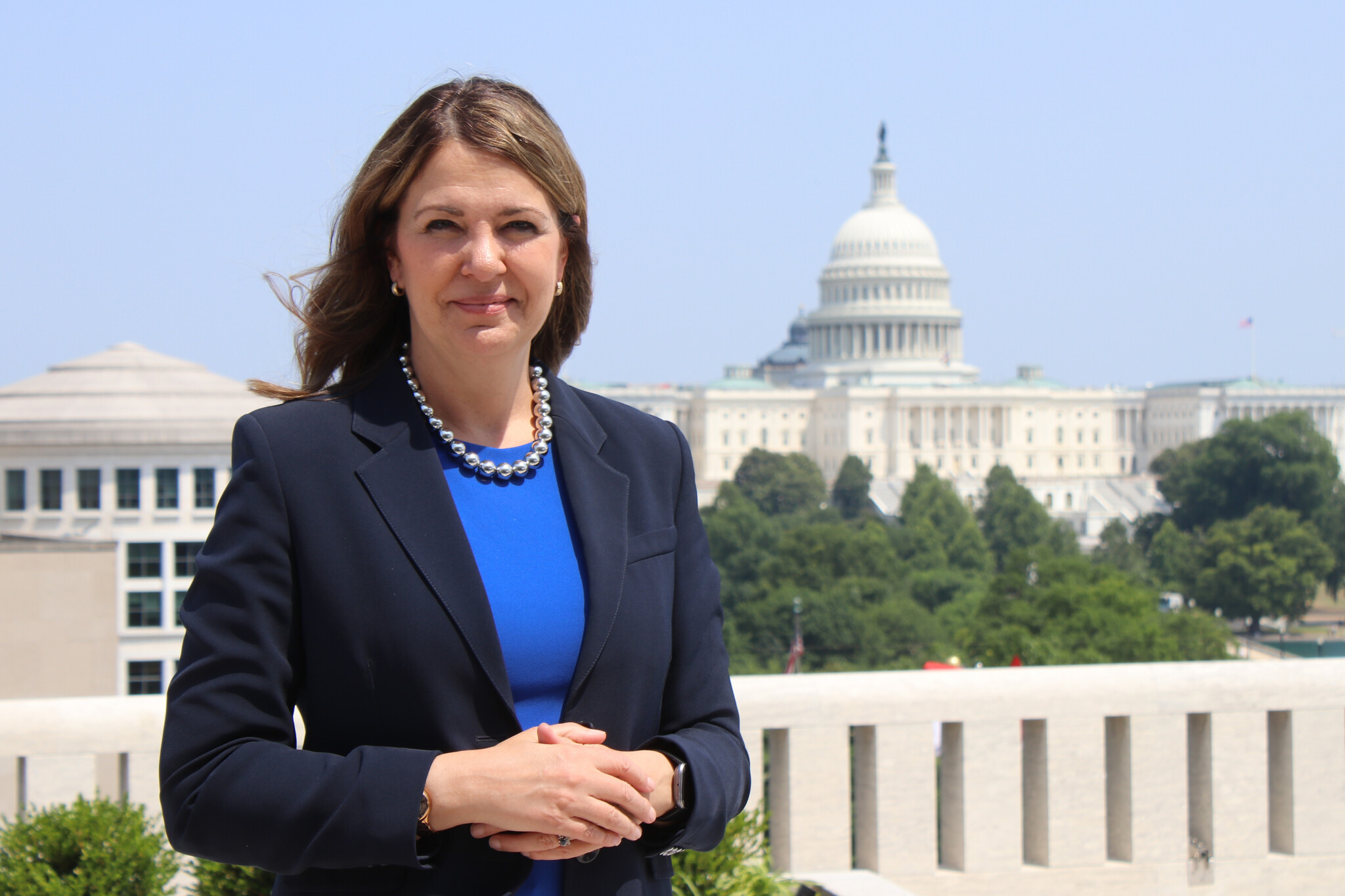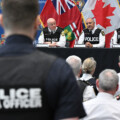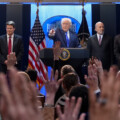When Alberta Premier Danielle Smith sat down alongside U.S. Ambassador Pete Hoekstra for a joint interview with The Hub, the mood was warm, even chummy. They traded compliments, swapped notes on trade and energy, and projected the kind of familiarity most Canadians would expect to see between national leaders.
“Danielle has developed her approach to bring prosperity to the people of Alberta,” said Hoekstra, calling the premier by her first name and speaking in unusually glowing terms.
“It’s hard-nosed business,” he continued. “It’s the kind of—if I can make a deal that’s going to bring prosperity, jobs, and wealth to the people of Alberta…I’m going to do it respectfully [and] it’s good for the people of Alberta.”
The praise was striking, not least because it came from a man who, only days earlier, when talking about Canada-U.S. relations, had gone viral for being—depending on your point of view—blunt, tone-deaf, or simply a jerk.
Even The Beaverton piled on with a satirical jab.
Yet in The Hub interview, he struck a different note. He sounded more measured, even acknowledging that Canadians may feel what they feel because of the Trump administration’s past comments about our country.
Still, both Hoekstra and Smith drew criticism.
YouTube comments are hardly a scientific measure of public opinion, but a good number of viewers found the exchange uncomfortably cozy. More than a few commentators inserted the puke emoji.
Yet strip away the video and read only the transcript, and much of it sounds like business as usual—the same careful diplomatic language anyone with experience in the file has used for decades. Even Prime Minister Mark Carney avoided antagonizing Trump and heaped on the praise amid the president’s hints of annexing Canada when he visited the White House this week.
As my former colleague at CBC, Kathleen Petty, once put it: no one wants to be “Zelensky’ed.”
So what explains the visceral reaction to the Smith-Hoekstra interview?
Tone.
The smiles, the ease, the friendliness. It’s the power of “show, don’t tell.”
People are entitled to their opinions. Those who resent the U.S. can keep boycotting American goods. But this kind of animosity can only run one way. If America stops buying from us, the economic shock would be immediate and devastating.
The federal government deserves praise for signalling its wish to forge new trade partnerships with Europe and Asia. That may even justify Carney’s many trips abroad since taking office.
But no amount of hurried missions across the Pacific or the Atlantic will fill a hole the size of America. Like it or not, the U.S. remains our dominant market and indispensable customer.
That is why Canada needs multiple lines of engagement—federal, provincial, and even personal. Only then do we have any leverage. Only then do we have the luxury of choice.
And this is where Smith enters the picture. Whatever one thinks of her politics, she has carved out a distinctive role in U.S. relations, more visible than most premiers and even some federal leaders.
That same soft power was on display months earlier at Mar-a-Lago, when Smith posed for photos with Trump during a fundraising event.
That, too, drew heat from Canadians. In Calgary, one of my neighbours posted a giant window sign declaring, “Smith is a traitor.”
But in an era when relationships can matter more than rules, especially in Trump’s orbit, Smith may just be positioning herself as Canada’s unofficial ambassador to the U.S.
And there’s more here than just BFF posts on social media.
Smith’s case for Alberta’s place in the U.S. starts with energy. During Hoekstra’s oilsands tour, she stressed that four million barrels a day flow from Alberta, most to U.S. refineries specifically tooled for processing Canadian crude.
It’s the same pitch Alberta’s envoy to Washington, Nathan Cooper, is making to governors and state legislators.
In their telling, Alberta isn’t just another supplier of goods.
After all, what is Canada to Trump if not a country that “sells too much stuff” to the U.S. without buying enough back? That trade imbalance was the very rationale for his global tariff strategy in the first place.
Simply pointing out how much we sell—or even how cheaply—does little to change the equation. If that works, China would’ve become Trump’s real BFF by now.
Instead, Alberta frames its value differently by presenting Canadian energy as the backbone of North American “energy dominance.”
And what’s more “Trumpy” than global dominance?
“We don’t want to see Iran or Russia or Venezuela expanding into markets and holding our friends and allies hostage,” Smith said in the joint interview.
She then cited an old Economist magazine article showing how China, over time, has displaced the U.S. as the biggest trading partner for most countries around the globe—everywhere, that is, except North America.
“We have stayed literally true blue friends,” she said, citing the colour the article used to highlight Canada and Mexico.
“And that’s why I think that by building on the strengths that we already have through the USMCA, that we’ll also be able to expand that influence…” Smith concluded. “If we’re going to have a big trade war…I would far rather see that North America, led by the United States, win that than China and its circle of influence.”
In just a few sentences, Smith managed to connect the dots—protecting Canadian interests while framing them in terms that resonate powerfully with Trump’s worldview.
In that same interview, Hoekstra himself confirmed Smith was “absolutely right” in how, for his boss, it’s all about “energy dominance.”
Of course, this approach comes with risks.
Critics worry Smith’s embrace of bilateralism could weaken Canada’s leverage. Her visible friendliness with Trump allies may complicate relations if Democrats return to power. And at home, she’s accused of swimming outside her lane just as Alberta faces pressing domestic crises ranging from a province-wide teachers’ strike to a strained health-care system.
But Smith seems undeterred.
As always, her calculation is that Alberta gains more by being proactive than by waiting for Ottawa’s talking points.
How effective Smith will be is an open question. Early in the tariff wars, she argued Canada should avoid maximalist retaliation. At the time, some dismissed her attitude as naïve.
Yet that is more or less how events have played out.
Carney, who built much of his Liberal rescue act on declaring a break with the U.S., has since walked back much of his rhetoric and even softened counter-tariffs. Interestingly enough, he also reportedly raised the prospect of reviving Keystone XL with Trump this week.
Ontario Premier Doug Ford, on the other hand, has yet to take off his Captain Canada cape. His Crown Royal-dumping theatrics remain a stark contrast to Smith’s more diplomatic style.
Ford’s over-the-top response may reflect the different ways Ontario and Alberta are hit economically by American sanctions, but it may also present a good-cop, bad-cop dynamic.
What is indisputable is that premiers have never had more face time with the prime minister—or with each other—than they do now. Confronting the world’s most powerful country demands all hands on deck.
And if this is a Team Canada effort, one premier stands out.












Comments (7)
This is a very informative article explaining who the adult is in the country’s “leadership” group. The country needs more Danielle Smith and much less silly emotion driven nationalism.